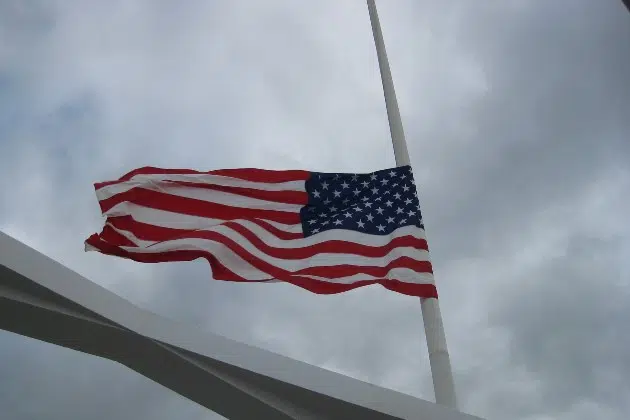WASHINGTON (AP) — The U.S. Army Special Operations Command on Monday identified the five Army aviation special operations forces killed when their helicopter crashed in the Eastern Mediterranean over the weekend, calling each a “national treasure” whose loss cut deeply.
The military’s European Command said the UH-60 helicopter went down during an air refueling mission as part of military training.
The five service members who died were Chief Warrant Officer 3 Stephen R. Dwyer, 38, of Clarksville, Tennessee; Chief Warrant Officer 2 Shane M. Barnes, 34, of Sacramento, California; Staff Sgt. Tanner W. Grone, 26, of Gorham, New Hampshire; Sgt. Andrew P. Southard, 27, of Apache Junction, Arizona; and Sgt. Cade M. Wolfe, 24, of Mankato, Minnesota. They were all part of the Army’s 160th Special Operations Aviation Regiment based at Fort Campbell, Kentucky.
The commander of the Army Special Operations Command, Lt. Gen. Jonathan Braga, said the fallen soldiers “hail from rare patriotic families with deep military service ties that span multiple generations and formations.”
“This is devastating news that reverberates across the entire Special Operations community,” Braga said on Monday in a statement. “Every loss is tough, but in this case, service to the Nation is truly a family business and it’s hard to express the amount of sorrow that we all feel right now.”
The fallen soldiers were highly decorated, with multiple combat deployments in addition to responding to deployments with no notice, sent overseas to respond quickly to various national security needs.
Dwyer received his commission in 2009 from the U.S. Military Academy in West Point, New York. He served as an MH-60M pilot, mission planner and instructor pilot and deployed to Iraq and Afghanistan. He was called up multiple times on no-notice deployments to support national security objectives, the Army Special Operations Command said. His awards and decorations include the Bronze Star Medal, the Meritorious Service Medal and the Air Medal with Combat device among many others.
Barnes, also an MH-60M pilot, graduated from Gonzaga University in Spokane, Washington, in 2011. He was assigned to Korea and completed deployments to Afghanistan and Iraq. He was awarded the Distinguished Flying Cross with Valor device and the Air Medal with Combat device among other campaign awards.
Grone enlisted in the Army in 2017 as a UH-60 repairer. He served as a flight instructor and and MH-60M crew chief for the 160th. He deployed to Afghanistan and multiple times to Iraq, and he was awarded the Air Medal with Combat device, the Army Commendation Medal and the Army Achievement Medal with combat device among many other awards.
Grone’s parents, Steve and Erica Grone, said of their son in a Facebook post that they were “beyond proud of what you became and believed in. Thank you for all these amazing years. Please watch over us. Love you and can’t express how much you will be missed.”
Southard enlisted in the Army in 2015 as a UH-60 repairer and served as an MH-60M crew chief. He was first assigned to Fort Bliss, Texas, upon completing advanced individual training, and he completed a 13-month rotation to Task Force Sinai in support of ongoing peacekeeping operations. He deployed to Afghanistan and was awarded two Army Commendation medals and an Army Achievement medal among other citations.
Wolfe enlisted in the Army in 2018 as a UH-60 repairer and served as an MH-60M crew chief. His awards and decorations include two Army Commendation medals and an Army Achievement medal.
This is the second fatal helicopter crash involving a unit based at Fort Campbell this year. In March, two HH-60 Black Hawk helicopters assigned to the 101st Airborne Division collided during a nighttime training flight, killing all nine soldiers aboard.
Fort Campbell is home to multiple Army aviation units. The 160th group has almost 3,000 soldiers and 200 aircraft assigned to it.
The U.S. has built up its force presence in the Eastern Mediterranean and the broader Middle East in response to Hamas’ Oct. 7 attack on Israel. There are two carrier strike groups operating in the region, U.S. Air Force squadrons have received additional crews and warplanes, and U.S. special operations forces have been added to help Israel in efforts to rescue hostages taken into Gaza.
___
Copyright 2023 The Associated Press. All rights reserved. This material may not be published, broadcast, rewritten or redistributed.
Latest News







